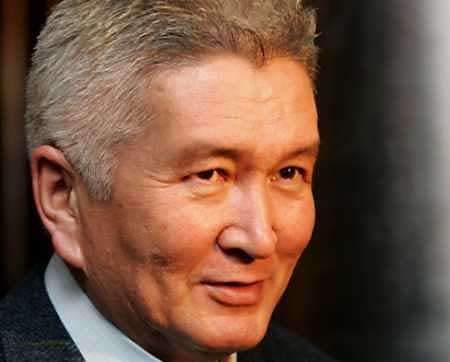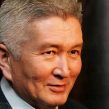
KULOV OPTIMISTIC ON EFFORTS TO DELINATE DIVISION OF POWERS BETWEEN PRESIDENT AND PRIME MINISTER
Publication: Eurasia Daily Monitor Volume: 2 Issue: 169
By:

Latent conflicts between the president’s and prime minister’s supporters in the Kyrgyz parliament became public during the September 12 debates on the draft legislation “On the Government Structure.”
Deputy Prime Ministers Daniyar Usenov and Adakhan Modumarov voted against Prime Minister Felix Kulov’s version of the bill, which, according to him, would clarify the respective duties of the president and prime minister. Kulov interpreted this protest from his deputies as a demonstrative attempt to “bring me up against Bakiyev,” to which he added, “If you notice that I’m maneuvering, usurping power, then do not spin intrigues, tell me openly to my face, and I will officially resign” (Akipress, September 8).
But contrary to expectations, Kyrgyz President Kurmanbek Bakiyev also disagreed with Kulov’s bill. Pro-Kulov parliamentarians regarded the president’s veto as Bakiyev’s attempt to secure control over key sectors of the national economy. Currently, the president has jurisdiction over Kyrgyz Railways, Kyrgyz Airlines, and financial intelligence agencies. During heated parliamentary discussions of the bill, Kabai Karabekov questioned the president’s real intentions in wanting to control these sectors: “I don’t understand why the president is not willing to control the ministries of culture, education, and health? Why is he only taking under his custody the energy sector, drugs, alcohol, etc.?” (Akipress, September 12).
As Bakiyev’s representative in parliament, Daniyar Narymbayev, observed, “It is absolutely wrong to assume that the president is trying to undermine some structures,” because the points of contention in the bill are administrative units that were created directly by the government (Akipress, September 12). But Professor Nur Omarov of the Russian-Slavic University thinks that the government will be stocked with pro-presidential cadres so that Kulov will eventually be pushed aside. “All he will be able to do is bang on the door, and Bakiyev’s team would be glad to see that,” says another Kyrgyz analyst.
Despite such murky forecasts for his political future, Kulov himself shows greater confidence in the viability of his partnership with the president. He has brushed aside suggestions that a political crisis could result from disputes over the government’s structure. Kulov referred to the current disagreements among him, the president, and the parliament as a positive development, saying, “There is nothing bad in this, and such deliberations should only be welcomed…the more parliamentarians, the more opinions. Out of respect for their views, a conference committee will be formed to develop an approach that will reflect our real economic situation” (Kabar, September 9).
Meanwhile, the Erkindik (Freedom) political party has collected some 100,000 signatures on a petition to dissolve the parliament. According to Erkindik’s chair, Adylbek Kasymov, by the end of October the party will have collected the 300,000 signatures required for initiating the dissolution of parliament. The party’s chief leader, Topchubek Turgunaliyev, an active adversary of the current parliament, thinks that until the results of the February-March 2005 parliamentary elections are canceled, the Tulip Revolution has not been fully realized (Radio Azattyk, September 1). However, neither Kulov nor Bakiyev supports the idea of annulling the parliament. On the contrary, this December an additional 30 parliamentarians will be elected.
With a bigger parliament, there will likely be fewer ministers and deputy prime ministers. The bill now under consideration suggests 12 ministries instead of the current 14 ministries, which would be achieved by merging the Ministry of Economic Development, Trade, and Production with the Ministry of Finance. Several ministries would be rearranged, with more functions added to the ministries of Tourism, Ecology, and Education. The current five deputy prime ministers would be reduced to two. The fewer deputy prime ministers may well be the source of Usenov and Modumarov’s discontent with Kulov.
Most of the parliamentarians would welcome such a government downsizing. Jantoro Satybaldiyev, for example, says that the government structure has been changing over the last 14 years, but it has never decreased its size; instead the same structures were merely renamed (Vecherny Bishkek, September 12). Kulov’s press office claims that the proposed changes would no longer be mere window dressing, but aimed at actually transforming internal arrangements (Akipress, September 11).
Though Kulov is optimistic about reaching a fair division of powers between him and Bakiyev, in light of recent radical changes in the Ukrainian government (see EDM, September 9), the peaceful resolution of his disagreement with the president and deputy prime ministers appears to be vital for avoiding a political crisis in Kyrgyzstan. According to Acting Foreign Minister Roza Otunbayeva, Ukraine’s problems have served as a warning to all political groups in Kyrgyzstan that they must find the right balance of powers for constructive collaboration (Radio Azattyk, September 12).
Bakiyev’s approval ratings have significantly declined since the presidential elections on July 10, even among his own voters. His recent appointment of his brother, Marat Bakiyev, as Ambassador to Germany generated wide criticism of his flagrant nepotism. At the same time, Kulov remains the most popular politician in Kyrgyzstan. Depending on how the government’s structure will be decided, the Bakiyev-Kulov team will either be regarded as a shrewd calculation from the start or a short-sighted move to win the elections.




